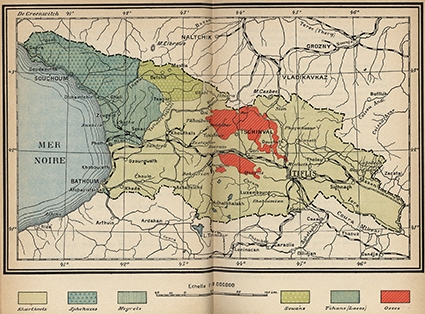Georgia in the Reference Books
Op-Ed
One can say that the world has enough knowledge of Georgia to make it recognizable, but the information presented in various reference books is amazingly disparate about our little country, especially when it comes to describing the Georgia of today as one of the world’s cartographically registered geopolitical units.
For instance, I went to the American Heritage Dictionary, which says of modern Georgia that it was a separate soviet republic from 1936 until its independence was declared in 1991, but to the delight of Georgians, it shows the full map of Georgia in which the land configuration of the country might make us feel we....territories at all.
Then I opened the good old Encyclopedia Britannica, which also demonstrates the nostalgic sealion contours of Georgia and presents it as a country which includes three ethnic enclaves – Abkhazia, Ajaria and South Ossetia. It is so good to know that we still have those lands, although two of them have definitely broken away, and who knows if they’ll ever come back or not. As I understand, Britannica either wants to make us Georgians feel good about ourselves, or it has no clue of what has lately happened to Georgia’s territorial integrity, the reinstatement of which is so ephemeral that the possibility no longer even pops up in our dreams. On the other hand, we can also say that the Britannica is very much into the decency of observing international law, be it effective or not these days.
The New World Encyclopedia, too, graphically shows the internationally accepted borders of Georgia. It also recognizes verbally the fact of the inclusion of Abkhazia and Ajaria in the Republic of Georgia but at the same time notes that the Kodori Gorge is the only part of Abkhazia that remains under effective Georgian control. There is something wrong here, isn’t there? The reference source also emphasizes that the status of South Ossetia, a former autonomous administrative district, is being negotiated with the Russian-supported separatist government. Is Georgia negotiating anything with the so-called South Ossetia? Have we recognized it as an independent state? If not, on what grounds are we negotiating anything with a non-existent state?
Let us now look at the famous Webster Dictionary, according to which the Republic of Georgia is an independent country of southwestern Asia, bordering on the Black Sea and the European part of Russia and including the autonomous republics of Abkhazia and Ajaria and the autonomous region of South Ossetia. Webster seems to be even deeper in history, respectfully maintaining a sincere sense of respect for the hurt political feelings of the Georgian people. The Webster map of Georgia is as intact as it used to be in the safer soviet times. Thank you for that!
And, finally, our faithful intellectual friend Wikipedia! The main article in English reflects the current situation more realistically than any other reference source available in the cyber world. It shows Georgia in two greenish colors: Georgia proper painted in dark green and the areas outside Georgian control given in light green, thus admitting the presence of Georgia’s ongoing geopolitical embarrassment and moral inconvenience. The article qualifies Georgia as a unitary semi-presidential constitutional republic, whereas the Russian article simply calls it a parliamentary republic, and the article in the Georgian language repeats the English version. Meanwhile, the Georgian article shows the map of complete pre-independence configuration, and the Russian article repeats the map of the English version.
According to official definition, a unitary state is a state governed as a single power in which the central government is ultimately supreme and any administrative divisions (sub-national units) exercise only the powers that the central government chooses to delegate. Is it overwhelmingly so in Georgia? Then, how about the relationships between the Republic and the capital city of the country where self-government is strongly supported by law? I wish I had a chance to go through every available reference source, but alas, this was impossible. I only have what I have, but the bottom-line is that the information about Georgia fed to the world is as bungled as our current geopolitical status is. This needs to be taken care of. How? Easy! We have to spend an affordable amount of money, at least occasionally, on introducing corrections to the reference sources that most of the world uses to find out about Georgia and build opinions thereof; opinion that, on its own, will play a significant role in building Georgia’s international image. What do we need the right international image for? To make it possible to talk to the rest of the world in Georgia’s favor.
Nugzar B. Ruhadze












